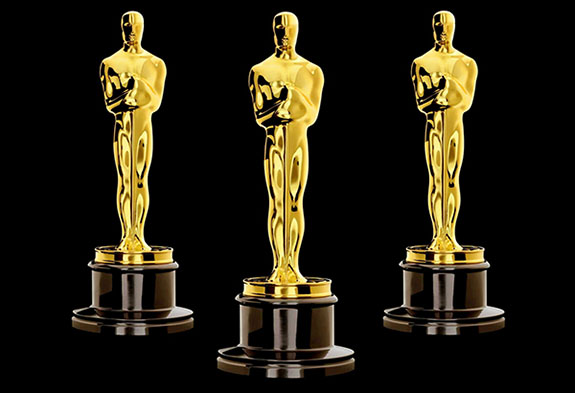Have You Ever Wondered If the Oscar Statuettes Are Made of Pure Gold?
On Sunday night, as you watched the cast and crew of Everything Everywhere All at Once scoop up seven Oscars at the 95th Academy Awards — including best picture and best actress — were you wondering if the gleaming statuettes were made of pure gold?

Well, the short answer is "yes and no."
Depicting a knight holding a crusader's sword, the Oscar was designed in 1928 by MGM art director Cedric Gibbons and sculpted by Los Angeles artist George Stanley. It is composed of 24-karat gold-plated bronze.
The sleek award stands 13.5 inches tall and weighs a hefty 8.5 pounds. If cast in 24-karat gold, the award would weigh 22.7 pounds, a mass equivalent to a large watermelon or two-year-old child. Gold is 2.7 times as dense as bronze.
Another reason the statuettes are not cast in sold gold is because of the prohibitive cost. At yesterday's gold spot price of $1,902 per ounce, each statue would require $690,000 worth of precious metal — and the Academy requires 60 statues each year.
The reporters at CNN did a wonderful job recounting the origin and evolution of the Oscars with an illustrated story on CNN.com.
CNN explained how the original statue was made from gold-plated bronze, but then changed to painted plaster during World War II, due to a scarcity of resources. In 1982, the bronze core was substituted for a pewter-based alloy, but changed back to bronze in 2016.
In that year, the UAP (Urban Art Projects) workshop in Rock Tavern, NY, worked with the Academy to create a new version of Oscar that would incorporate the best elements from the original design and those of the more recent incarnations.
UAP uses a lost-wax method to cast the awards in bronze. In the finishing phase, the bronze castings are meticulously checked for minor flaws, polished and plated — first in copper and nickel and finally in 24-karat gold.
“By the time you get to the end," UAP general manager Jake Joyce told CNN.com, "the final Oscar is much smaller than the original because they’re always grinding and sanding and polishing and taking away metal.”
Trailblazing actor and filmmaker Douglas Fairbanks hosted the 1st Academy Awards in 1929 at The Hollywood Roosevelt Hotel. The award ceremony became must-see TV starting in 1953. Sunday's broadcast was seen in 200 territories worldwide and attracted 16 million viewers in the US alone.
Credit: Oscar statuettes by Amdrewcs81, CC BY-SA 4.0, via Wikimedia Commons.

Well, the short answer is "yes and no."
Depicting a knight holding a crusader's sword, the Oscar was designed in 1928 by MGM art director Cedric Gibbons and sculpted by Los Angeles artist George Stanley. It is composed of 24-karat gold-plated bronze.
The sleek award stands 13.5 inches tall and weighs a hefty 8.5 pounds. If cast in 24-karat gold, the award would weigh 22.7 pounds, a mass equivalent to a large watermelon or two-year-old child. Gold is 2.7 times as dense as bronze.
Another reason the statuettes are not cast in sold gold is because of the prohibitive cost. At yesterday's gold spot price of $1,902 per ounce, each statue would require $690,000 worth of precious metal — and the Academy requires 60 statues each year.
The reporters at CNN did a wonderful job recounting the origin and evolution of the Oscars with an illustrated story on CNN.com.
CNN explained how the original statue was made from gold-plated bronze, but then changed to painted plaster during World War II, due to a scarcity of resources. In 1982, the bronze core was substituted for a pewter-based alloy, but changed back to bronze in 2016.
In that year, the UAP (Urban Art Projects) workshop in Rock Tavern, NY, worked with the Academy to create a new version of Oscar that would incorporate the best elements from the original design and those of the more recent incarnations.
UAP uses a lost-wax method to cast the awards in bronze. In the finishing phase, the bronze castings are meticulously checked for minor flaws, polished and plated — first in copper and nickel and finally in 24-karat gold.
“By the time you get to the end," UAP general manager Jake Joyce told CNN.com, "the final Oscar is much smaller than the original because they’re always grinding and sanding and polishing and taking away metal.”
Trailblazing actor and filmmaker Douglas Fairbanks hosted the 1st Academy Awards in 1929 at The Hollywood Roosevelt Hotel. The award ceremony became must-see TV starting in 1953. Sunday's broadcast was seen in 200 territories worldwide and attracted 16 million viewers in the US alone.
Credit: Oscar statuettes by Amdrewcs81, CC BY-SA 4.0, via Wikimedia Commons.

